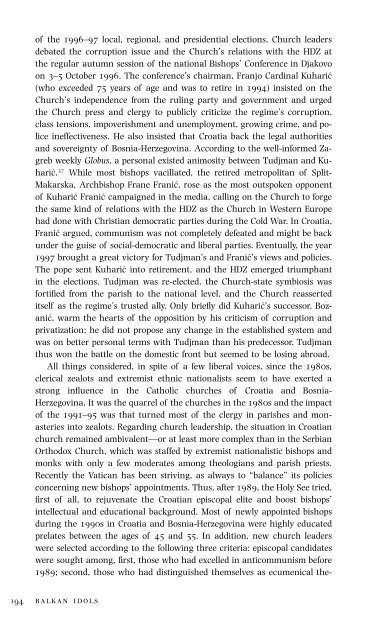Balkan Idols: Religion and Nationalism in Yugoslav States
Balkan Idols: Religion and Nationalism in Yugoslav States
Balkan Idols: Religion and Nationalism in Yugoslav States
You also want an ePaper? Increase the reach of your titles
YUMPU automatically turns print PDFs into web optimized ePapers that Google loves.
of the 1996–97 local, regional, <strong>and</strong> presidential elections, Church leaders<br />
debated the corruption issue <strong>and</strong> the Church’s relations with the HDZ at<br />
the regular autumn session of the national Bishops’ Conference <strong>in</strong> Djakovo<br />
on 3–5 October 1996. The conference’s chairman, Franjo Card<strong>in</strong>al Kuharić<br />
(who exceeded 75 years of age <strong>and</strong> was to retire <strong>in</strong> 1994) <strong>in</strong>sisted on the<br />
Church’s <strong>in</strong>dependence from the rul<strong>in</strong>g party <strong>and</strong> government <strong>and</strong> urged<br />
the Church press <strong>and</strong> clergy to publicly criticize the regime’s corruption,<br />
class tensions, impoverishment <strong>and</strong> unemployment, grow<strong>in</strong>g crime, <strong>and</strong> police<br />
<strong>in</strong>effectiveness. He also <strong>in</strong>sisted that Croatia back the legal authorities<br />
<strong>and</strong> sovereignty of Bosnia-Herzegov<strong>in</strong>a. Accord<strong>in</strong>g to the well-<strong>in</strong>formed Zagreb<br />
weekly Globus, a personal existed animosity between Tudjman <strong>and</strong> Kuharić.<br />
37 While most bishops vacillated, the retired metropolitan of Split-<br />
Makarska, Archbishop Frane Franić, rose as the most outspoken opponent<br />
of Kuharić Franić campaigned <strong>in</strong> the media, call<strong>in</strong>g on the Church to forge<br />
the same k<strong>in</strong>d of relations with the HDZ as the Church <strong>in</strong> Western Europe<br />
had done with Christian democratic parties dur<strong>in</strong>g the Cold War. In Croatia,<br />
Franić argued, communism was not completely defeated <strong>and</strong> might be back<br />
under the guise of social-democratic <strong>and</strong> liberal parties. Eventually, the year<br />
1997 brought a great victory for Tudjman’s <strong>and</strong> Franić’s views <strong>and</strong> policies.<br />
The pope sent Kuharić <strong>in</strong>to retirement, <strong>and</strong> the HDZ emerged triumphant<br />
<strong>in</strong> the elections. Tudjman was re-elected, the Church-state symbiosis was<br />
fortified from the parish to the national level, <strong>and</strong> the Church reasserted<br />
itself as the regime’s trusted ally. Only briefly did Kuharić’s successor, Bozanić,<br />
warm the hearts of the opposition by his criticism of corruption <strong>and</strong><br />
privatization; he did not propose any change <strong>in</strong> the established system <strong>and</strong><br />
was on better personal terms with Tudjman than his predecessor. Tudjman<br />
thus won the battle on the domestic front but seemed to be los<strong>in</strong>g abroad.<br />
All th<strong>in</strong>gs considered, <strong>in</strong> spite of a few liberal voices, s<strong>in</strong>ce the 1980s,<br />
clerical zealots <strong>and</strong> extremist ethnic nationalists seem to have exerted a<br />
strong <strong>in</strong>fluence <strong>in</strong> the Catholic churches of Croatia <strong>and</strong> Bosnia-<br />
Herzegov<strong>in</strong>a. It was the quarrel of the churches <strong>in</strong> the 1980s <strong>and</strong> the impact<br />
of the 1991–95 was that turned most of the clergy <strong>in</strong> parishes <strong>and</strong> monasteries<br />
<strong>in</strong>to zealots. Regard<strong>in</strong>g church leadership, the situation <strong>in</strong> Croatian<br />
church rema<strong>in</strong>ed ambivalent—or at least more complex than <strong>in</strong> the Serbian<br />
Orthodox Church, which was staffed by extremist nationalistic bishops <strong>and</strong><br />
monks with only a few moderates among theologians <strong>and</strong> parish priests.<br />
Recently the Vatican has been striv<strong>in</strong>g, as always to “balance” its policies<br />
concern<strong>in</strong>g new bishops’ appo<strong>in</strong>tments. Thus, after 1989, the Holy See tried,<br />
first of all, to rejuvenate the Croatian episcopal elite <strong>and</strong> boost bishops’<br />
<strong>in</strong>tellectual <strong>and</strong> educational background. Most of newly appo<strong>in</strong>ted bishops<br />
dur<strong>in</strong>g the 1990s <strong>in</strong> Croatia <strong>and</strong> Bosnia-Herzegov<strong>in</strong>a were highly educated<br />
prelates between the ages of 45 <strong>and</strong> 55. In addition, new church leaders<br />
were selected accord<strong>in</strong>g to the follow<strong>in</strong>g three criteria: episcopal c<strong>and</strong>idates<br />
were sought among, first, those who had excelled <strong>in</strong> anticommunism before<br />
1989; second, those who had dist<strong>in</strong>guished themselves as ecumenical the-<br />
194 balkan idols


